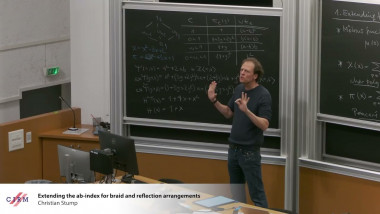
Extending the ab-index for braid and reflection arrangements
De Christian Stump

Modularity of special cycles in orthogonal and unitary Shimura varieties
De Salim Tayou
Let X be a smooth and projective complex algebraic variety. Several notions, describing how close X is to projective space, have been developed: X is rational if an open subset of X is isomorphic to an open of a projective space, X is stably rational if this property holds for a product of X with some projective space, and X is unirational if X is rationally dominated by a projective space. A classical Lüroth problem is to find unirational nonrational varieties. This problem remained open till 1970th, when three types of such examples were produced: cubic threefolds (Clemens and Griffiths), some quartic threefolds (Iskovskikh and Manin), and some conic bundles (Artin et Mumford). The last examples are even not stably rational. The stable rationality of the first two examples was not known. In a recent work C. Voisin established that a double solid ramified along a very general quartic is not stably rational. Inspired by this work, we showed that many quartic solids are not stably rational (joint work with J.-L. Colliot-Thélène). More generally, B. Totaro showed that a very general hypersurface of degree d is not stably rational if d/2 is at least the smallest integer not smaller than (n+2)/3. The same method allowed us to show that the rationality is not a deformation invariant (joint with B. Hassett and Y. Tschinkel). In this series of lectures, we will discuss the methods to obtain the results above: the universal properties of the Chow group of zero-cycles, the decomposition of the diagonal, and the specialization arguments.
